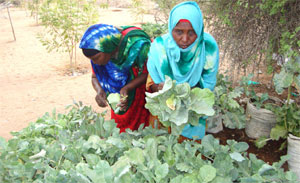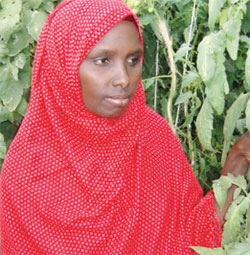By ADOW JUBAT and BONIFACE ONGERI
Until two years ago, Nuria Mohamud Adan regarded Sukuma wiki (kales) as fodder for livestock and held them in nauseating contempt.
"I found it strange that people ate leaves!" she said. Like the rest of North Eastern Province, fermented pancake, locally called anjera, spaghetti, meat, and camel milk was the staple food in her Borehole Five village in Lagdera District.
Proposals to introduce kales on the sandy region to supplement vitamins in their meals and provide income were resisted. |
Women picking sukuma wiki. |
Five people suffered serious injuries in July 2009 when a humanitarian aid agency Fafi Integrated Development Association (Faida) introduced kale.
Faida project co-ordinator Mohammed Abdi Shale said they wanted to introduce farming as an alternative economic venture to the unsustainable nomadic lifestyle that has been facing threats from sporadic drought and diseases.
Regain dignity
Says Nuria: "We rioted when Faida asked us for a piece of land to demonstrate farming. Back then it was a big joke, an abomination to ask us to grow leaves for a living".
"When we lost our livestock we were desperate for help to restock our animals, but instead we met people talking about us growing ‘shrubs’. We didn’t buy the idea because it didn’t make much sense then and we had to chase them away," she said.
Today it is a finger licking addition to their daily diet and the project they attempted to scuttle has made them mini-millionaires and the envy of neighbouring villages.
While the rest of the district is reeling from effects of drought, Borehole Five is a picture of verdant land painted by sukuma wiki. Others call it an oasis. The kales are kept alive by irrigation.
Adan Mohammed Farah, who lost his livestock to drought in 2006, observed that growing vegetables has helped him regain dignity.
"After my entire livestock was decimated I retreated to a sedentary life. It was hard to stand before people because I did not have wealth. Now I have regained some status and command respect because I have money from the sale of vegetables," he said when The Standard On Saturday caught up with him at his farm. "Most of us have educated our children or started other businesses."
Cutting trees
Today he cuts the figure of a veteran farmer. "We never thought after we failed in livestock farming we should venture into crop farming. We entertained the idea but we had reservations because of its sustainability in our sun-battered village. But you can see what for yourselves," he said sweeping his hand across a lush green stretch of kales. The farmers also produce watermelon and spinach.
A nutritionist at the Alinjugur Dispensary said that diseases that were caused by lack of vitamins like scurvy have tremendously reduced because of the consumption of greens. Today, markets that once only sold livestock and related products now have to accommodate the ‘leaves’.  |
Nuria Mohammed on her farm (left) and Adan Mohammed Farah weeding his farm.[PICTURES: BONIFACE ONGERI/STANDARD] COURTESY] |
Residents here are picking scattered pieces after suffering effects of drought for many years and Faida is helping them rebuild lives. The Japanese Embassy, through United Nations Humanitarian Commission on Refugees (UNHCR), funds the initiative under the Environmental Restoration Programme.
He said there are more than 275 groups of farmers who also integrate tree planting in the farms and areas left bare to address the environmental degradation caused by large influx of refugees from Somalia.
About 100, 000 trees have also been planted in enclosures that were left bare by the activities of the refugees that included cutting and carting away the trees for fuel and shelter.
Faida say they assessed the viability of farming and found that the province was right.
Green houses
"The only problem is water but returns are about 95 per cent unlike in other areas where it is 65 per cent. The province also requires minimum pesticides," Shale said.
To minimise the use of the scarce water and attack from pesticides, Faida bought two green houses. In green house they use drip irrigation.
"We have negotiated with one of the companies that manufactures green houses to provide the farmers with the same on credit. The farmers will pay because they are making more than Sh30, 000 in profit.
"Our work is to teach them how to fish.
"Besides providing technical people to train them on farming, we also provide farming tools, seeds and pesticides," Shale said.
Nuria is looking forward to another project – poultry keeping. "This would be interesting too because we never used to eat poultry products," she observes.
"We won’t put much resistance because it could turn out to be of much benefit," she said.
 The Standard Group Plc is a multi-media organization with investments in media
platforms spanning newspaper print operations, television, radio broadcasting,
digital and online services. The Standard Group is recognized as a leading
multi-media house in Kenya with a key influence in matters of national and
international interest.
The Standard Group Plc is a multi-media organization with investments in media
platforms spanning newspaper print operations, television, radio broadcasting,
digital and online services. The Standard Group is recognized as a leading
multi-media house in Kenya with a key influence in matters of national and
international interest.
 The Standard Group Plc is a multi-media organization with investments in media
platforms spanning newspaper print operations, television, radio broadcasting,
digital and online services. The Standard Group is recognized as a leading
multi-media house in Kenya with a key influence in matters of national and
international interest.
The Standard Group Plc is a multi-media organization with investments in media
platforms spanning newspaper print operations, television, radio broadcasting,
digital and online services. The Standard Group is recognized as a leading
multi-media house in Kenya with a key influence in matters of national and
international interest.











